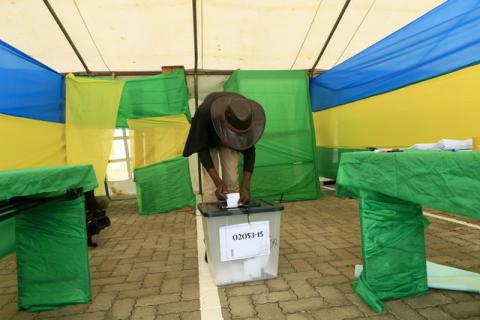Advertisement
Rwandans vote on constitution changes to let Kagame extend rule
KIGALI (Reuters) - Rwandans voted on Friday in a referendum on changing the constitution that would allow President Paul Kagame to extend his term in office, possibly until 2034, despite criticism of such an amendment by the United States and other Western donors.
Kagame would be able to run again after his second mandate ends under the changes, which are expected to pass. Kagame, 58, has been president since 2000 but effectively in control since his rebel force marched into Kigali in 1994 to end a genocide.
The United States, a major donor that has praised Kagame for rebuilding the nation since the genocide, said this month Kagame should resist the lure of power and step down in 2017 to allow a new generation of leaders to come through.
It is the latest case of a long-serving ruler in Africa seeking to extend his hold on power. Similar moves have already sparked violence and instability in Burundi and Congo Republic. So far there has been no unrest in Rwanda.
"Rwanda is secure now and it's thanks to him," Musa Habimana, 60, a businessman, said after voting, echoing the views of many who back a leader credited with ending a massacre in which 800,000 mostly Tutsis and moderate Hutus were killed.
Rwanda has a Hutu ethnic majority and Tutsi minority. Kagame, a Tutsi, urges Rwandans to identify themselves by their nation, not their ethnic background.
Despite his success in delivering economic and social change, rights groups accuse the government of stifling the media and political opposition, a charge it denies.
The tiny Democratic Green Party, the only real opposition party, tried to get the constitutional changes blocked through the courts but this was rejected.
The party also said it was not given the opportunity to campaign. "It was not a level playing field," said party leader Frank Habineza.
Western diplomats also said the changes were rushed through.
"Kagame clearly enjoys considerable public support across the country, but it is difficult to know what many Rwandans really think," wrote Carina Tertsakian of Human Rights Watch, citing restrictions on free speech.
The government has dismissed such criticism. It says the decision to change the constitution and hold a referendum was taken after a public petition was presented to parliament with 3.7 million signatories in a nation of 11 million people.
Kagame, who last swept to office in a vote in 2010, has not said if he would run again but has said he was open to persuasion. Under the changes, he would be allowed another seven-year term and two five-year terms after that.
(Writing by Edmund Blair; Editing by Paul Tait)



















Add new comment